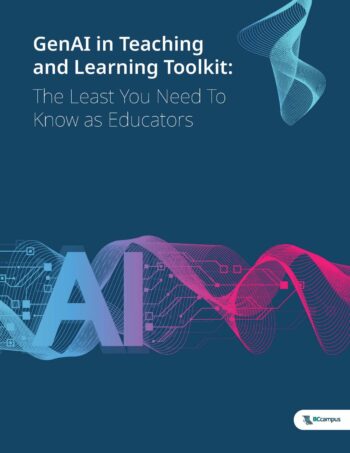


Except where otherwise noted, the contents of this guide were created by humans (not bots) and are licensed under a Creative Commons Attribution-ShareAlike 4.0 International License (CC BY-SA 4.0).
It is unlikely that any of us can accurately predict what the world of higher education will look like next year, or even in the next few months. Artificial intelligence is upending much of what we assumed to be stable. You don't have to navigate this uncertain future on your own. We are here to help!
The Dr. Lloyd Morin Centre for Excellence in Teaching and Learning regularly hosts workshops on a variety of topics, including the implications of artificial intelligence in teaching and learning. Many workshops are hosted in hybrid format so that you can attend in-person or online. Look for the next offering by visiting our CETL Events Calendar or ask for information by emailing cetl@camosun.ca.
CETL educational developers and instructional designers are available for one-to-one consultation or to facilitate a conversation within your department. See our list of faculty members here or send an email to cetl@camosun.ca to request a consultation. CETL has facilitated tailored AI sessions in departments such as English, Biology, Humanities, Psychology, Trades, Academic Advising, and others.
It is vitally important that we work together as colleagues, departments, and a college community, toward creating an educational environment where AI is used appropriately, ethically, and with learning as our main focus. Talk with your colleagues, share ideas, and keep the conversation going. You can also join a Community of Practice to connect with colleagues across campus.
Writing and reasoning are intimately linked. Not only is writing a useful tool for measuring student learning, but writing is, in itself, a way of thinking through complex ideas and problems. It is a way to learn about our self, our beliefs, and our world. This is why, despite the emergence of generative artificial intelligence (GenAI) tools like ChatGPT, writing remains an essential skill. Chatbots have obvious utility and appeal: they generate sophisticated, human-sounding text in a matter of seconds. So how do we continue to teach writing, and to use writing as a teaching tool, in an age of GenAI? How can we encourage students to engage in those challenging yet meaningful learning experiences that are only accessible through writing? How do we position GenAI as a tool that might support complex thinking and self-expression rather than one that can be used as a shortcut around it?
In the recording below, guest speaker Anna Mills leads a discussion of teaching with and about writing in an age of GenAI. Mills is an English instructor at College of Marin and Cañada College in San Francisco, CA. She is a leading voice on AI in higher education and a regular contributor to public conversations about the implications of Gen AI for teaching and learning. Mills is author of the open textbook How Arguments Work: A Guide to Writing and Analyzing Texts in College; creator of AI Text Generators and Teaching Writing: Starting Points for Inquiry; co-editor of the forthcoming (2025) edition Bad Ideas about AI and Writing: Toward Generative Practices for Teaching, Learning, and Communication; and a member of the MLA/CCCC task force on writing and AI.
Following Mills’ talk, workshop participants gathered to debrief, share ideas and inspiration, and discuss strategies for teaching and learning in writing-intensive disciplines in an age of GenAI.